An In-Depth Exploration of Emotion's Impact on Memory
VerifiedAdded on 2020/12/09
|12
|3234
|356
Essay
AI Summary
This essay provides a comprehensive analysis of the intricate relationship between emotions and memory. It begins by defining emotions and their neurobiological basis, emphasizing their impact on learning and memorization. The essay then delves into how emotions influence memory at various stages, including encoding, consolidation, and retrieval, highlighting the role of emotional arousal. It explores brain regions involved in memory and emotion, such as the frontal and temporal lobes, amygdala, hippocampus, and cerebral cortex, detailing how these regions are affected by emotional states. The essay further examines the role of neurotransmitters like dopamine, serotonin, and norepinephrine in emotional memory, and discusses concepts such as flashbulb memory and false memory syndrome. Finally, it touches upon the implications of emotional disturbances like PTSD and their effects on memory processes.
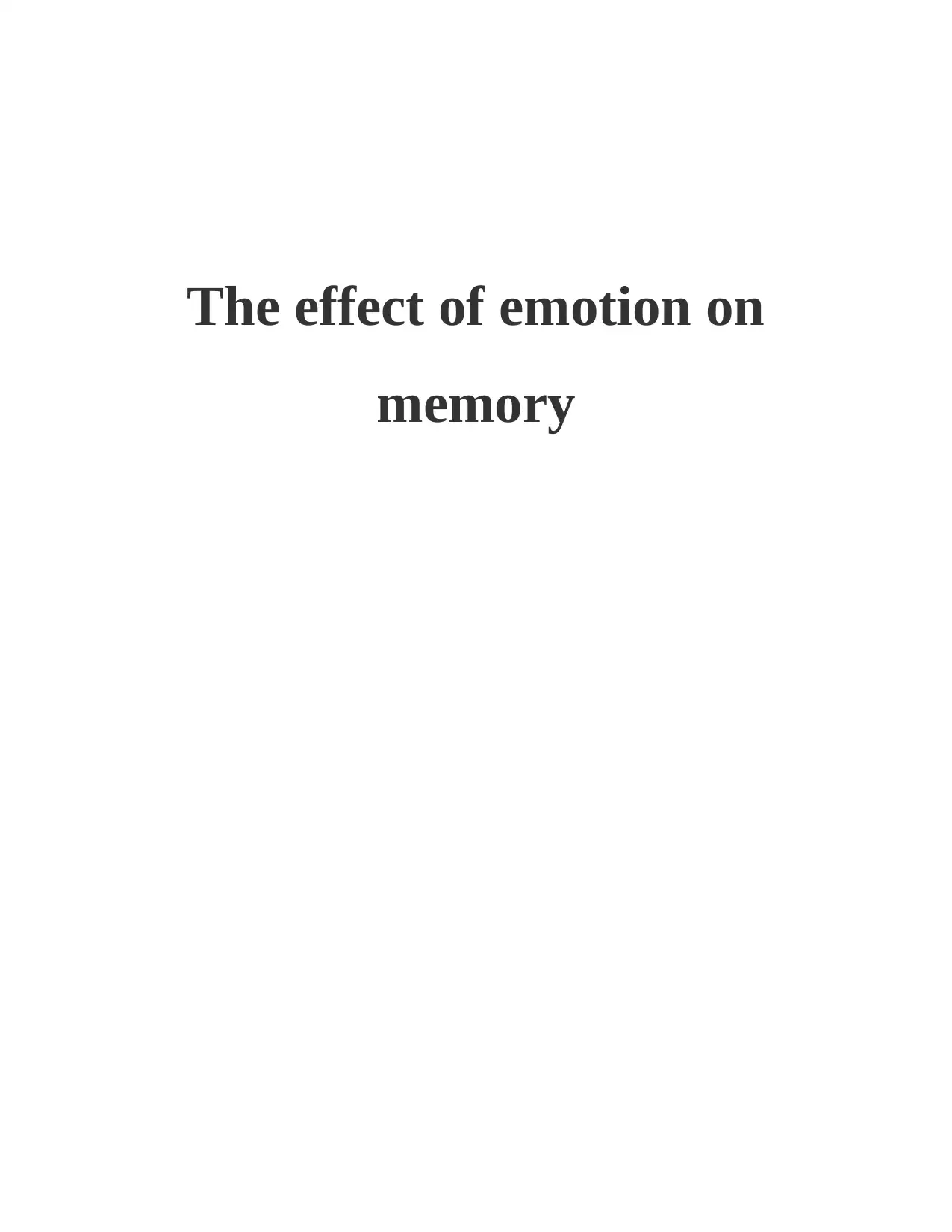
The effect of emotion on
memory
memory
Paraphrase This Document
Need a fresh take? Get an instant paraphrase of this document with our AI Paraphraser

TABLE OF CONTENTS
INTRODUCTION..........................................................................................................................1
ESSAY.............................................................................................................................................1
CONCLUSION ...............................................................................................................................8
REFERENCES ...............................................................................................................................9
INTRODUCTION..........................................................................................................................1
ESSAY.............................................................................................................................................1
CONCLUSION ...............................................................................................................................8
REFERENCES ...............................................................................................................................9
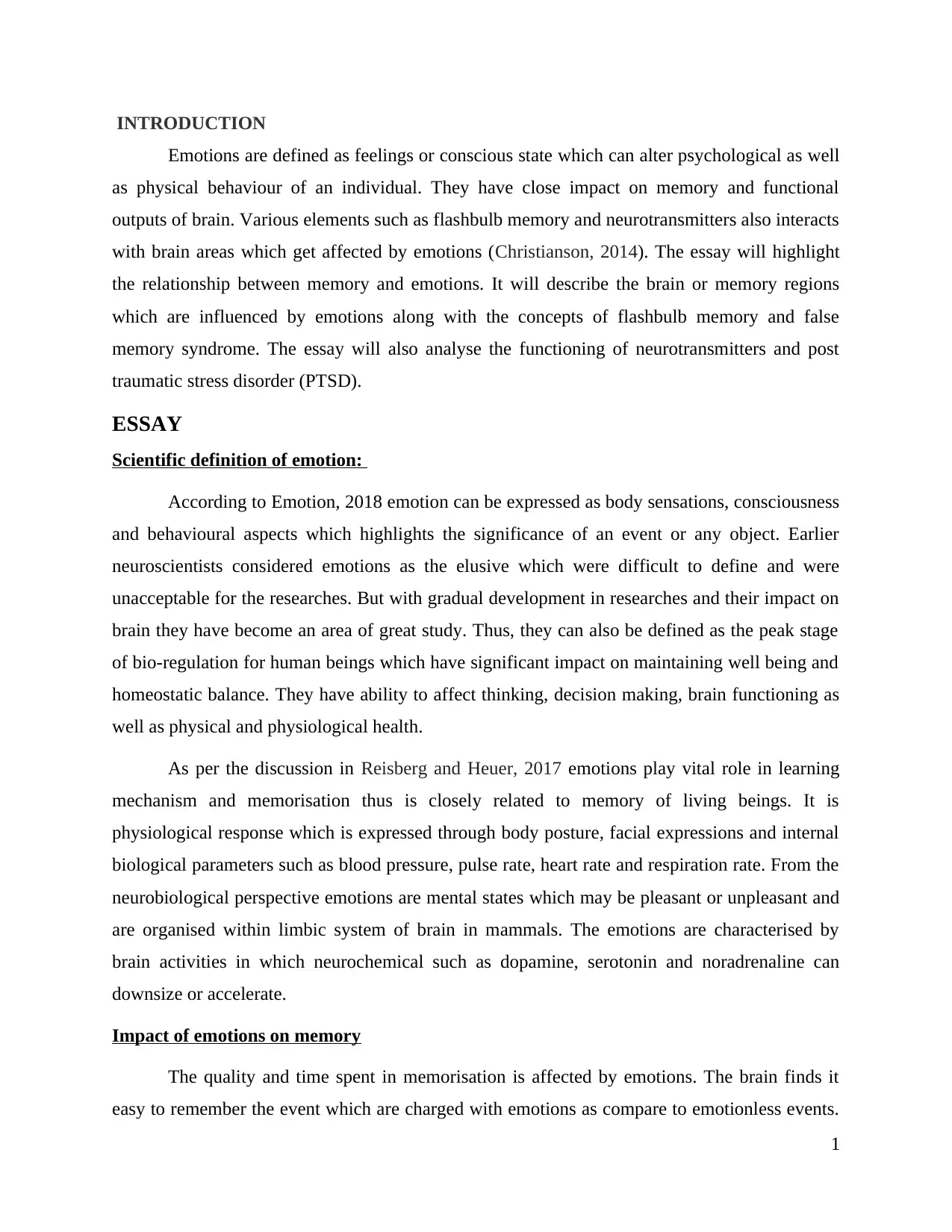
INTRODUCTION
Emotions are defined as feelings or conscious state which can alter psychological as well
as physical behaviour of an individual. They have close impact on memory and functional
outputs of brain. Various elements such as flashbulb memory and neurotransmitters also interacts
with brain areas which get affected by emotions (Christianson, 2014). The essay will highlight
the relationship between memory and emotions. It will describe the brain or memory regions
which are influenced by emotions along with the concepts of flashbulb memory and false
memory syndrome. The essay will also analyse the functioning of neurotransmitters and post
traumatic stress disorder (PTSD).
ESSAY
Scientific definition of emotion:
According to Emotion, 2018 emotion can be expressed as body sensations, consciousness
and behavioural aspects which highlights the significance of an event or any object. Earlier
neuroscientists considered emotions as the elusive which were difficult to define and were
unacceptable for the researches. But with gradual development in researches and their impact on
brain they have become an area of great study. Thus, they can also be defined as the peak stage
of bio-regulation for human beings which have significant impact on maintaining well being and
homeostatic balance. They have ability to affect thinking, decision making, brain functioning as
well as physical and physiological health.
As per the discussion in Reisberg and Heuer, 2017 emotions play vital role in learning
mechanism and memorisation thus is closely related to memory of living beings. It is
physiological response which is expressed through body posture, facial expressions and internal
biological parameters such as blood pressure, pulse rate, heart rate and respiration rate. From the
neurobiological perspective emotions are mental states which may be pleasant or unpleasant and
are organised within limbic system of brain in mammals. The emotions are characterised by
brain activities in which neurochemical such as dopamine, serotonin and noradrenaline can
downsize or accelerate.
Impact of emotions on memory
The quality and time spent in memorisation is affected by emotions. The brain finds it
easy to remember the event which are charged with emotions as compare to emotionless events.
1
Emotions are defined as feelings or conscious state which can alter psychological as well
as physical behaviour of an individual. They have close impact on memory and functional
outputs of brain. Various elements such as flashbulb memory and neurotransmitters also interacts
with brain areas which get affected by emotions (Christianson, 2014). The essay will highlight
the relationship between memory and emotions. It will describe the brain or memory regions
which are influenced by emotions along with the concepts of flashbulb memory and false
memory syndrome. The essay will also analyse the functioning of neurotransmitters and post
traumatic stress disorder (PTSD).
ESSAY
Scientific definition of emotion:
According to Emotion, 2018 emotion can be expressed as body sensations, consciousness
and behavioural aspects which highlights the significance of an event or any object. Earlier
neuroscientists considered emotions as the elusive which were difficult to define and were
unacceptable for the researches. But with gradual development in researches and their impact on
brain they have become an area of great study. Thus, they can also be defined as the peak stage
of bio-regulation for human beings which have significant impact on maintaining well being and
homeostatic balance. They have ability to affect thinking, decision making, brain functioning as
well as physical and physiological health.
As per the discussion in Reisberg and Heuer, 2017 emotions play vital role in learning
mechanism and memorisation thus is closely related to memory of living beings. It is
physiological response which is expressed through body posture, facial expressions and internal
biological parameters such as blood pressure, pulse rate, heart rate and respiration rate. From the
neurobiological perspective emotions are mental states which may be pleasant or unpleasant and
are organised within limbic system of brain in mammals. The emotions are characterised by
brain activities in which neurochemical such as dopamine, serotonin and noradrenaline can
downsize or accelerate.
Impact of emotions on memory
The quality and time spent in memorisation is affected by emotions. The brain finds it
easy to remember the event which are charged with emotions as compare to emotionless events.
1
⊘ This is a preview!⊘
Do you want full access?
Subscribe today to unlock all pages.

Trusted by 1+ million students worldwide
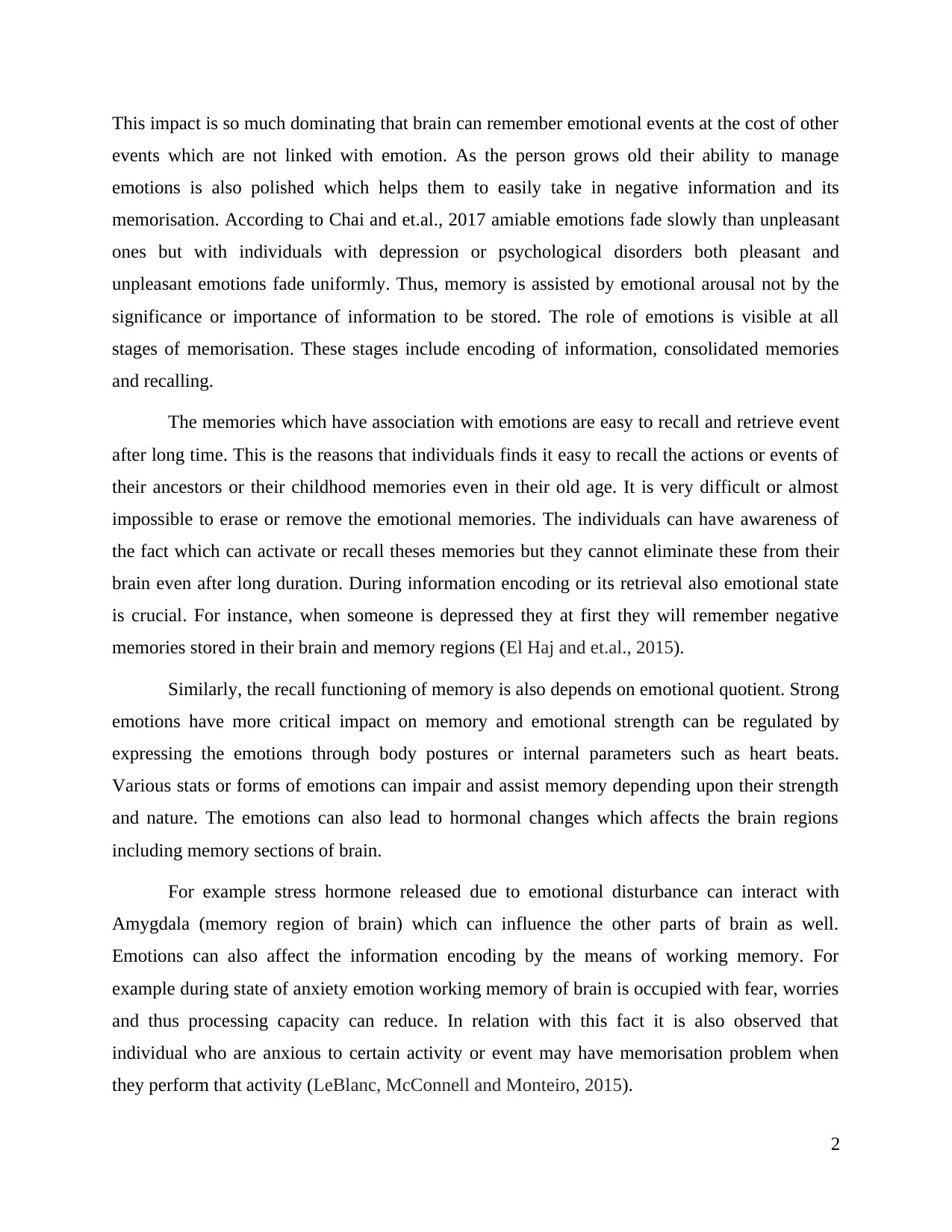
This impact is so much dominating that brain can remember emotional events at the cost of other
events which are not linked with emotion. As the person grows old their ability to manage
emotions is also polished which helps them to easily take in negative information and its
memorisation. According to Chai and et.al., 2017 amiable emotions fade slowly than unpleasant
ones but with individuals with depression or psychological disorders both pleasant and
unpleasant emotions fade uniformly. Thus, memory is assisted by emotional arousal not by the
significance or importance of information to be stored. The role of emotions is visible at all
stages of memorisation. These stages include encoding of information, consolidated memories
and recalling.
The memories which have association with emotions are easy to recall and retrieve event
after long time. This is the reasons that individuals finds it easy to recall the actions or events of
their ancestors or their childhood memories even in their old age. It is very difficult or almost
impossible to erase or remove the emotional memories. The individuals can have awareness of
the fact which can activate or recall theses memories but they cannot eliminate these from their
brain even after long duration. During information encoding or its retrieval also emotional state
is crucial. For instance, when someone is depressed they at first they will remember negative
memories stored in their brain and memory regions (El Haj and et.al., 2015).
Similarly, the recall functioning of memory is also depends on emotional quotient. Strong
emotions have more critical impact on memory and emotional strength can be regulated by
expressing the emotions through body postures or internal parameters such as heart beats.
Various stats or forms of emotions can impair and assist memory depending upon their strength
and nature. The emotions can also lead to hormonal changes which affects the brain regions
including memory sections of brain.
For example stress hormone released due to emotional disturbance can interact with
Amygdala (memory region of brain) which can influence the other parts of brain as well.
Emotions can also affect the information encoding by the means of working memory. For
example during state of anxiety emotion working memory of brain is occupied with fear, worries
and thus processing capacity can reduce. In relation with this fact it is also observed that
individual who are anxious to certain activity or event may have memorisation problem when
they perform that activity (LeBlanc, McConnell and Monteiro, 2015).
2
events which are not linked with emotion. As the person grows old their ability to manage
emotions is also polished which helps them to easily take in negative information and its
memorisation. According to Chai and et.al., 2017 amiable emotions fade slowly than unpleasant
ones but with individuals with depression or psychological disorders both pleasant and
unpleasant emotions fade uniformly. Thus, memory is assisted by emotional arousal not by the
significance or importance of information to be stored. The role of emotions is visible at all
stages of memorisation. These stages include encoding of information, consolidated memories
and recalling.
The memories which have association with emotions are easy to recall and retrieve event
after long time. This is the reasons that individuals finds it easy to recall the actions or events of
their ancestors or their childhood memories even in their old age. It is very difficult or almost
impossible to erase or remove the emotional memories. The individuals can have awareness of
the fact which can activate or recall theses memories but they cannot eliminate these from their
brain even after long duration. During information encoding or its retrieval also emotional state
is crucial. For instance, when someone is depressed they at first they will remember negative
memories stored in their brain and memory regions (El Haj and et.al., 2015).
Similarly, the recall functioning of memory is also depends on emotional quotient. Strong
emotions have more critical impact on memory and emotional strength can be regulated by
expressing the emotions through body postures or internal parameters such as heart beats.
Various stats or forms of emotions can impair and assist memory depending upon their strength
and nature. The emotions can also lead to hormonal changes which affects the brain regions
including memory sections of brain.
For example stress hormone released due to emotional disturbance can interact with
Amygdala (memory region of brain) which can influence the other parts of brain as well.
Emotions can also affect the information encoding by the means of working memory. For
example during state of anxiety emotion working memory of brain is occupied with fear, worries
and thus processing capacity can reduce. In relation with this fact it is also observed that
individual who are anxious to certain activity or event may have memorisation problem when
they perform that activity (LeBlanc, McConnell and Monteiro, 2015).
2
Paraphrase This Document
Need a fresh take? Get an instant paraphrase of this document with our AI Paraphraser
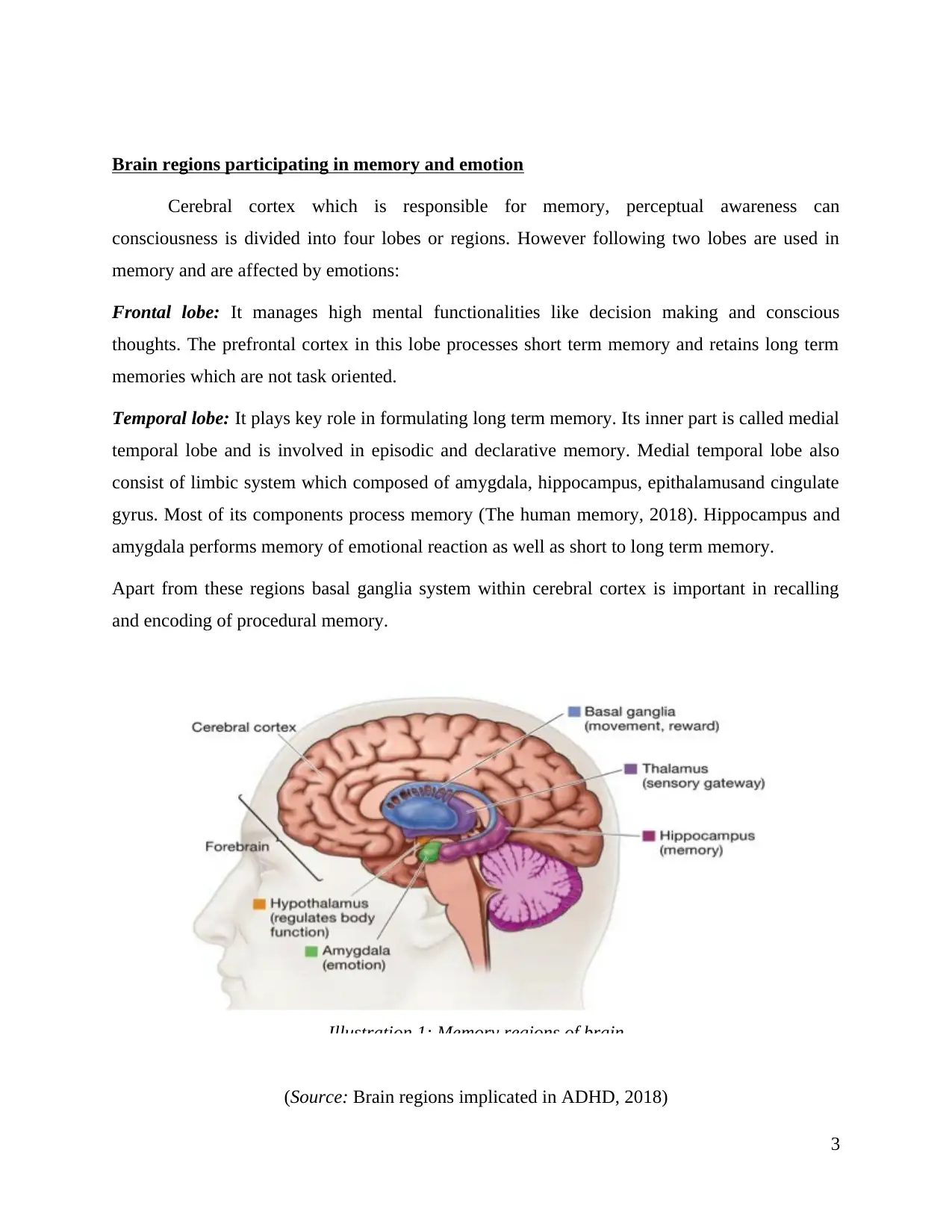
Brain regions participating in memory and emotion
Cerebral cortex which is responsible for memory, perceptual awareness can
consciousness is divided into four lobes or regions. However following two lobes are used in
memory and are affected by emotions:
Frontal lobe: It manages high mental functionalities like decision making and conscious
thoughts. The prefrontal cortex in this lobe processes short term memory and retains long term
memories which are not task oriented.
Temporal lobe: It plays key role in formulating long term memory. Its inner part is called medial
temporal lobe and is involved in episodic and declarative memory. Medial temporal lobe also
consist of limbic system which composed of amygdala, hippocampus, epithalamusand cingulate
gyrus. Most of its components process memory (The human memory, 2018). Hippocampus and
amygdala performs memory of emotional reaction as well as short to long term memory.
Apart from these regions basal ganglia system within cerebral cortex is important in recalling
and encoding of procedural memory.
(Source: Brain regions implicated in ADHD, 2018)
3
Illustration 1: Memory regions of brain
Cerebral cortex which is responsible for memory, perceptual awareness can
consciousness is divided into four lobes or regions. However following two lobes are used in
memory and are affected by emotions:
Frontal lobe: It manages high mental functionalities like decision making and conscious
thoughts. The prefrontal cortex in this lobe processes short term memory and retains long term
memories which are not task oriented.
Temporal lobe: It plays key role in formulating long term memory. Its inner part is called medial
temporal lobe and is involved in episodic and declarative memory. Medial temporal lobe also
consist of limbic system which composed of amygdala, hippocampus, epithalamusand cingulate
gyrus. Most of its components process memory (The human memory, 2018). Hippocampus and
amygdala performs memory of emotional reaction as well as short to long term memory.
Apart from these regions basal ganglia system within cerebral cortex is important in recalling
and encoding of procedural memory.
(Source: Brain regions implicated in ADHD, 2018)
3
Illustration 1: Memory regions of brain
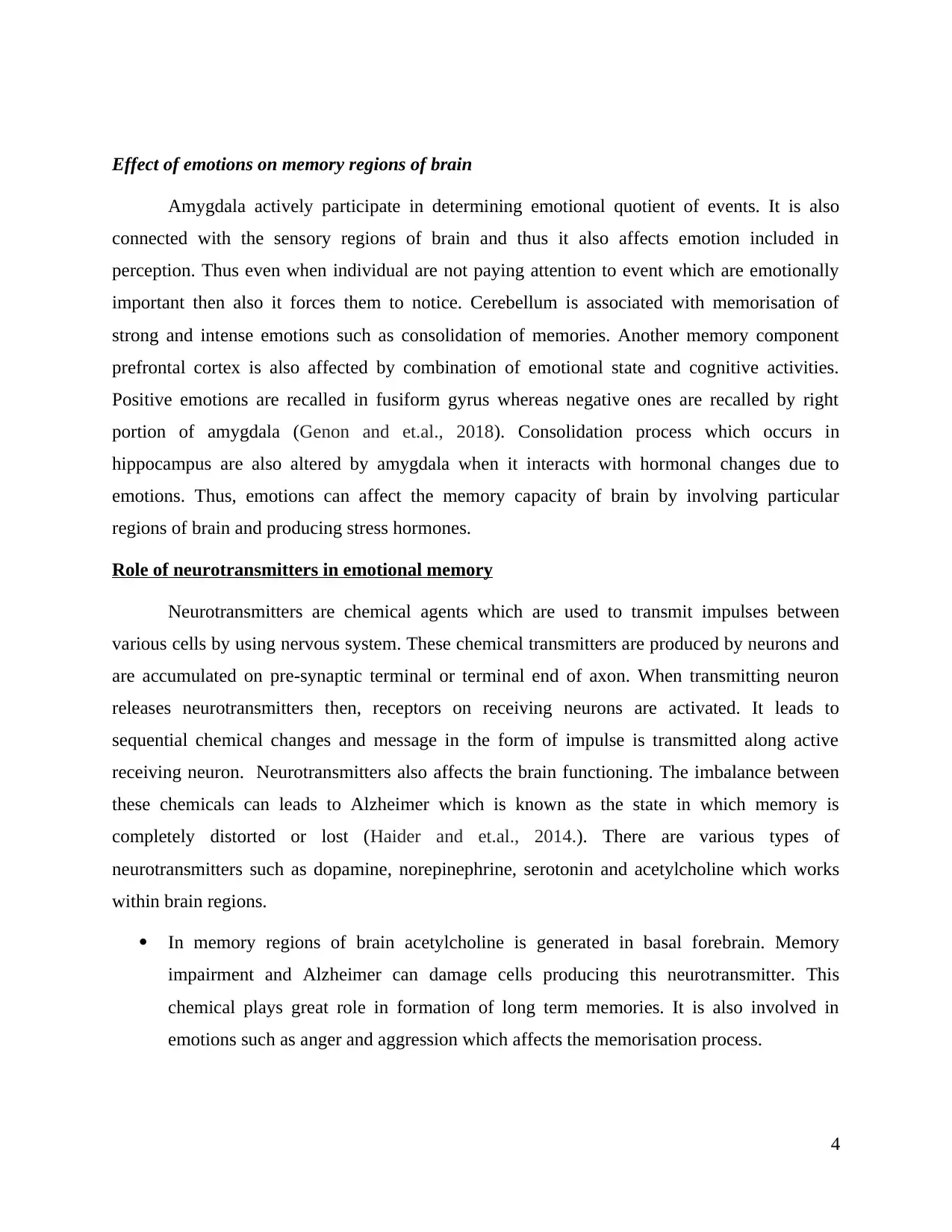
Effect of emotions on memory regions of brain
Amygdala actively participate in determining emotional quotient of events. It is also
connected with the sensory regions of brain and thus it also affects emotion included in
perception. Thus even when individual are not paying attention to event which are emotionally
important then also it forces them to notice. Cerebellum is associated with memorisation of
strong and intense emotions such as consolidation of memories. Another memory component
prefrontal cortex is also affected by combination of emotional state and cognitive activities.
Positive emotions are recalled in fusiform gyrus whereas negative ones are recalled by right
portion of amygdala (Genon and et.al., 2018). Consolidation process which occurs in
hippocampus are also altered by amygdala when it interacts with hormonal changes due to
emotions. Thus, emotions can affect the memory capacity of brain by involving particular
regions of brain and producing stress hormones.
Role of neurotransmitters in emotional memory
Neurotransmitters are chemical agents which are used to transmit impulses between
various cells by using nervous system. These chemical transmitters are produced by neurons and
are accumulated on pre-synaptic terminal or terminal end of axon. When transmitting neuron
releases neurotransmitters then, receptors on receiving neurons are activated. It leads to
sequential chemical changes and message in the form of impulse is transmitted along active
receiving neuron. Neurotransmitters also affects the brain functioning. The imbalance between
these chemicals can leads to Alzheimer which is known as the state in which memory is
completely distorted or lost (Haider and et.al., 2014.). There are various types of
neurotransmitters such as dopamine, norepinephrine, serotonin and acetylcholine which works
within brain regions.
In memory regions of brain acetylcholine is generated in basal forebrain. Memory
impairment and Alzheimer can damage cells producing this neurotransmitter. This
chemical plays great role in formation of long term memories. It is also involved in
emotions such as anger and aggression which affects the memorisation process.
4
Amygdala actively participate in determining emotional quotient of events. It is also
connected with the sensory regions of brain and thus it also affects emotion included in
perception. Thus even when individual are not paying attention to event which are emotionally
important then also it forces them to notice. Cerebellum is associated with memorisation of
strong and intense emotions such as consolidation of memories. Another memory component
prefrontal cortex is also affected by combination of emotional state and cognitive activities.
Positive emotions are recalled in fusiform gyrus whereas negative ones are recalled by right
portion of amygdala (Genon and et.al., 2018). Consolidation process which occurs in
hippocampus are also altered by amygdala when it interacts with hormonal changes due to
emotions. Thus, emotions can affect the memory capacity of brain by involving particular
regions of brain and producing stress hormones.
Role of neurotransmitters in emotional memory
Neurotransmitters are chemical agents which are used to transmit impulses between
various cells by using nervous system. These chemical transmitters are produced by neurons and
are accumulated on pre-synaptic terminal or terminal end of axon. When transmitting neuron
releases neurotransmitters then, receptors on receiving neurons are activated. It leads to
sequential chemical changes and message in the form of impulse is transmitted along active
receiving neuron. Neurotransmitters also affects the brain functioning. The imbalance between
these chemicals can leads to Alzheimer which is known as the state in which memory is
completely distorted or lost (Haider and et.al., 2014.). There are various types of
neurotransmitters such as dopamine, norepinephrine, serotonin and acetylcholine which works
within brain regions.
In memory regions of brain acetylcholine is generated in basal forebrain. Memory
impairment and Alzheimer can damage cells producing this neurotransmitter. This
chemical plays great role in formation of long term memories. It is also involved in
emotions such as anger and aggression which affects the memorisation process.
4
⊘ This is a preview!⊘
Do you want full access?
Subscribe today to unlock all pages.

Trusted by 1+ million students worldwide
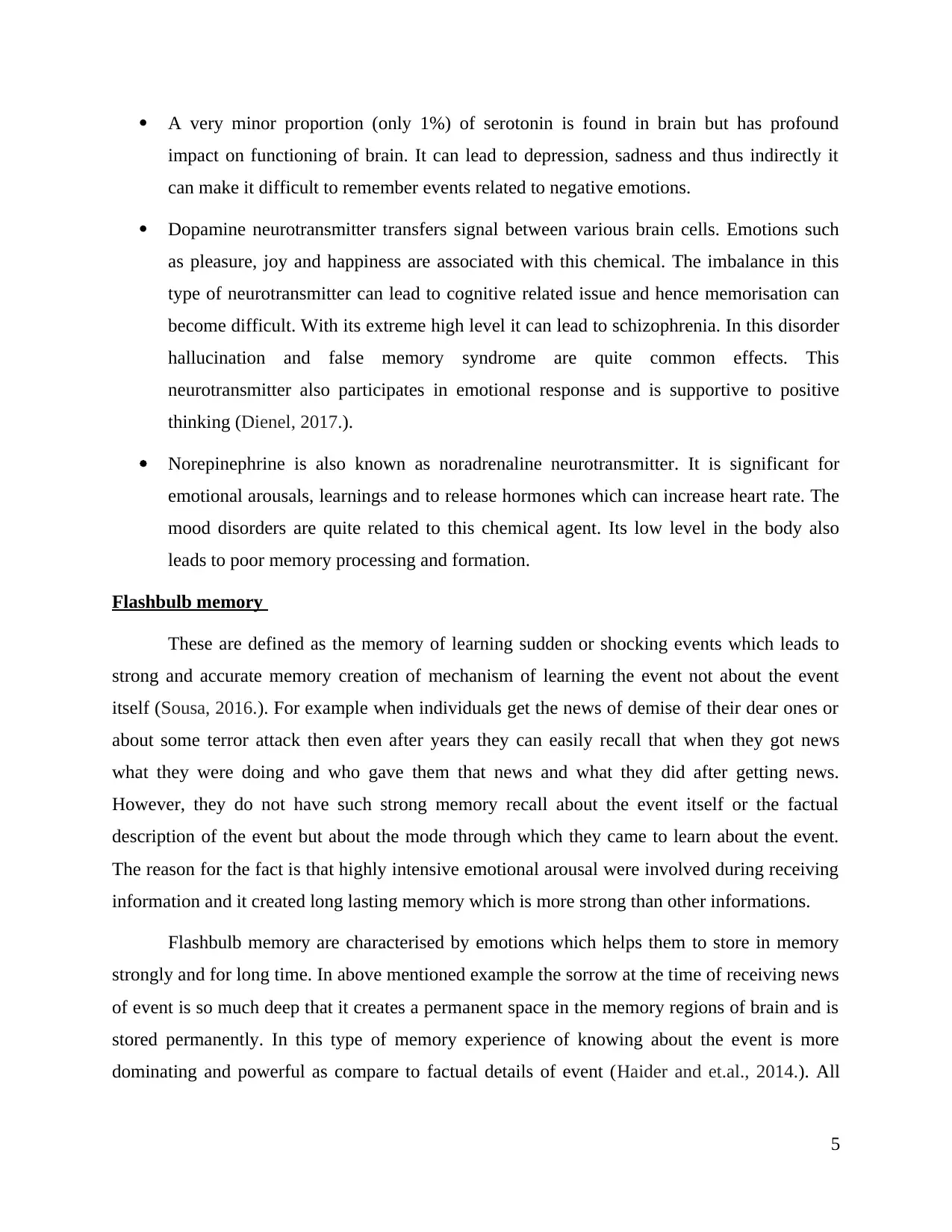
A very minor proportion (only 1%) of serotonin is found in brain but has profound
impact on functioning of brain. It can lead to depression, sadness and thus indirectly it
can make it difficult to remember events related to negative emotions.
Dopamine neurotransmitter transfers signal between various brain cells. Emotions such
as pleasure, joy and happiness are associated with this chemical. The imbalance in this
type of neurotransmitter can lead to cognitive related issue and hence memorisation can
become difficult. With its extreme high level it can lead to schizophrenia. In this disorder
hallucination and false memory syndrome are quite common effects. This
neurotransmitter also participates in emotional response and is supportive to positive
thinking (Dienel, 2017.).
Norepinephrine is also known as noradrenaline neurotransmitter. It is significant for
emotional arousals, learnings and to release hormones which can increase heart rate. The
mood disorders are quite related to this chemical agent. Its low level in the body also
leads to poor memory processing and formation.
Flashbulb memory
These are defined as the memory of learning sudden or shocking events which leads to
strong and accurate memory creation of mechanism of learning the event not about the event
itself (Sousa, 2016.). For example when individuals get the news of demise of their dear ones or
about some terror attack then even after years they can easily recall that when they got news
what they were doing and who gave them that news and what they did after getting news.
However, they do not have such strong memory recall about the event itself or the factual
description of the event but about the mode through which they came to learn about the event.
The reason for the fact is that highly intensive emotional arousal were involved during receiving
information and it created long lasting memory which is more strong than other informations.
Flashbulb memory are characterised by emotions which helps them to store in memory
strongly and for long time. In above mentioned example the sorrow at the time of receiving news
of event is so much deep that it creates a permanent space in the memory regions of brain and is
stored permanently. In this type of memory experience of knowing about the event is more
dominating and powerful as compare to factual details of event (Haider and et.al., 2014.). All
5
impact on functioning of brain. It can lead to depression, sadness and thus indirectly it
can make it difficult to remember events related to negative emotions.
Dopamine neurotransmitter transfers signal between various brain cells. Emotions such
as pleasure, joy and happiness are associated with this chemical. The imbalance in this
type of neurotransmitter can lead to cognitive related issue and hence memorisation can
become difficult. With its extreme high level it can lead to schizophrenia. In this disorder
hallucination and false memory syndrome are quite common effects. This
neurotransmitter also participates in emotional response and is supportive to positive
thinking (Dienel, 2017.).
Norepinephrine is also known as noradrenaline neurotransmitter. It is significant for
emotional arousals, learnings and to release hormones which can increase heart rate. The
mood disorders are quite related to this chemical agent. Its low level in the body also
leads to poor memory processing and formation.
Flashbulb memory
These are defined as the memory of learning sudden or shocking events which leads to
strong and accurate memory creation of mechanism of learning the event not about the event
itself (Sousa, 2016.). For example when individuals get the news of demise of their dear ones or
about some terror attack then even after years they can easily recall that when they got news
what they were doing and who gave them that news and what they did after getting news.
However, they do not have such strong memory recall about the event itself or the factual
description of the event but about the mode through which they came to learn about the event.
The reason for the fact is that highly intensive emotional arousal were involved during receiving
information and it created long lasting memory which is more strong than other informations.
Flashbulb memory are characterised by emotions which helps them to store in memory
strongly and for long time. In above mentioned example the sorrow at the time of receiving news
of event is so much deep that it creates a permanent space in the memory regions of brain and is
stored permanently. In this type of memory experience of knowing about the event is more
dominating and powerful as compare to factual details of event (Haider and et.al., 2014.). All
5
Paraphrase This Document
Need a fresh take? Get an instant paraphrase of this document with our AI Paraphraser
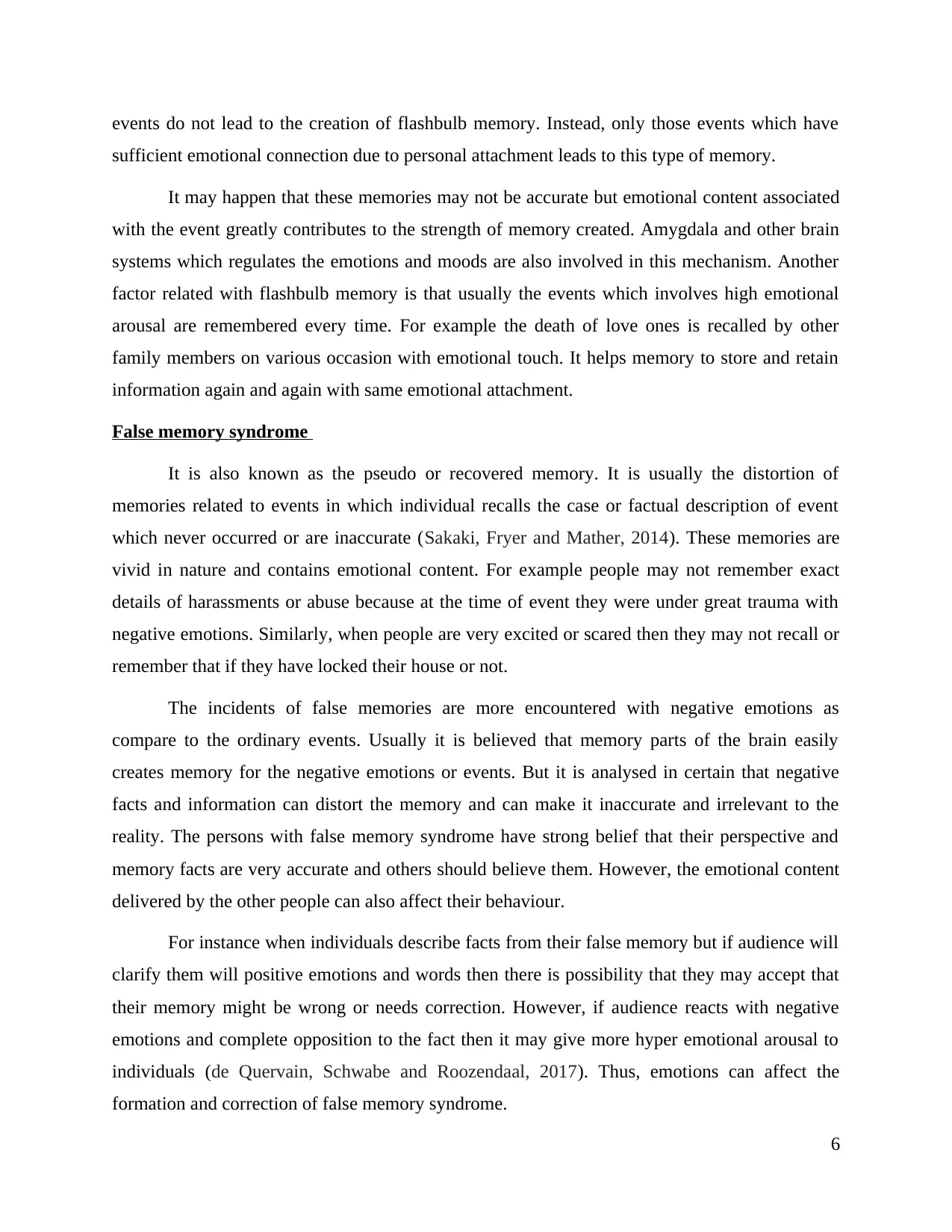
events do not lead to the creation of flashbulb memory. Instead, only those events which have
sufficient emotional connection due to personal attachment leads to this type of memory.
It may happen that these memories may not be accurate but emotional content associated
with the event greatly contributes to the strength of memory created. Amygdala and other brain
systems which regulates the emotions and moods are also involved in this mechanism. Another
factor related with flashbulb memory is that usually the events which involves high emotional
arousal are remembered every time. For example the death of love ones is recalled by other
family members on various occasion with emotional touch. It helps memory to store and retain
information again and again with same emotional attachment.
False memory syndrome
It is also known as the pseudo or recovered memory. It is usually the distortion of
memories related to events in which individual recalls the case or factual description of event
which never occurred or are inaccurate (Sakaki, Fryer and Mather, 2014). These memories are
vivid in nature and contains emotional content. For example people may not remember exact
details of harassments or abuse because at the time of event they were under great trauma with
negative emotions. Similarly, when people are very excited or scared then they may not recall or
remember that if they have locked their house or not.
The incidents of false memories are more encountered with negative emotions as
compare to the ordinary events. Usually it is believed that memory parts of the brain easily
creates memory for the negative emotions or events. But it is analysed in certain that negative
facts and information can distort the memory and can make it inaccurate and irrelevant to the
reality. The persons with false memory syndrome have strong belief that their perspective and
memory facts are very accurate and others should believe them. However, the emotional content
delivered by the other people can also affect their behaviour.
For instance when individuals describe facts from their false memory but if audience will
clarify them will positive emotions and words then there is possibility that they may accept that
their memory might be wrong or needs correction. However, if audience reacts with negative
emotions and complete opposition to the fact then it may give more hyper emotional arousal to
individuals (de Quervain, Schwabe and Roozendaal, 2017). Thus, emotions can affect the
formation and correction of false memory syndrome.
6
sufficient emotional connection due to personal attachment leads to this type of memory.
It may happen that these memories may not be accurate but emotional content associated
with the event greatly contributes to the strength of memory created. Amygdala and other brain
systems which regulates the emotions and moods are also involved in this mechanism. Another
factor related with flashbulb memory is that usually the events which involves high emotional
arousal are remembered every time. For example the death of love ones is recalled by other
family members on various occasion with emotional touch. It helps memory to store and retain
information again and again with same emotional attachment.
False memory syndrome
It is also known as the pseudo or recovered memory. It is usually the distortion of
memories related to events in which individual recalls the case or factual description of event
which never occurred or are inaccurate (Sakaki, Fryer and Mather, 2014). These memories are
vivid in nature and contains emotional content. For example people may not remember exact
details of harassments or abuse because at the time of event they were under great trauma with
negative emotions. Similarly, when people are very excited or scared then they may not recall or
remember that if they have locked their house or not.
The incidents of false memories are more encountered with negative emotions as
compare to the ordinary events. Usually it is believed that memory parts of the brain easily
creates memory for the negative emotions or events. But it is analysed in certain that negative
facts and information can distort the memory and can make it inaccurate and irrelevant to the
reality. The persons with false memory syndrome have strong belief that their perspective and
memory facts are very accurate and others should believe them. However, the emotional content
delivered by the other people can also affect their behaviour.
For instance when individuals describe facts from their false memory but if audience will
clarify them will positive emotions and words then there is possibility that they may accept that
their memory might be wrong or needs correction. However, if audience reacts with negative
emotions and complete opposition to the fact then it may give more hyper emotional arousal to
individuals (de Quervain, Schwabe and Roozendaal, 2017). Thus, emotions can affect the
formation and correction of false memory syndrome.
6
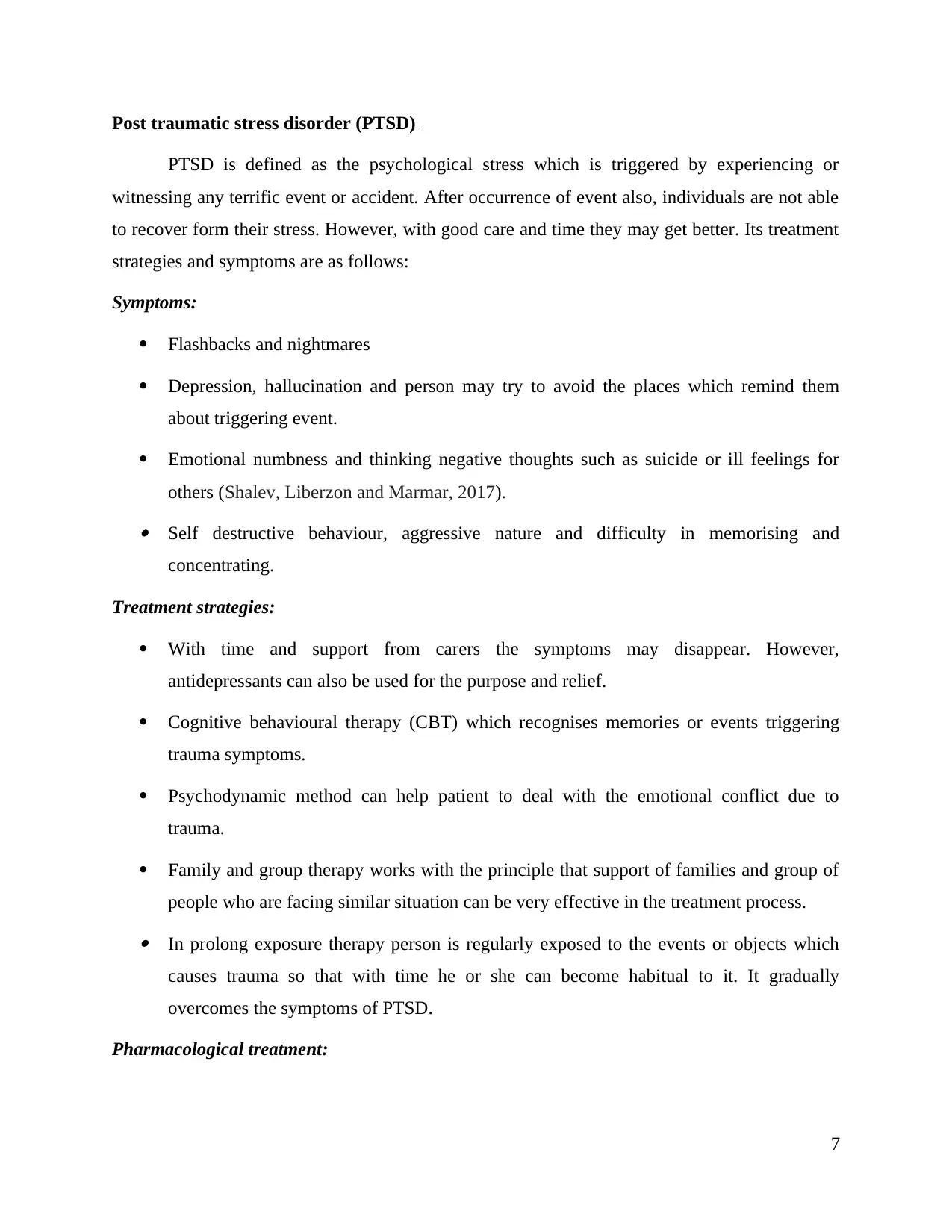
Post traumatic stress disorder (PTSD)
PTSD is defined as the psychological stress which is triggered by experiencing or
witnessing any terrific event or accident. After occurrence of event also, individuals are not able
to recover form their stress. However, with good care and time they may get better. Its treatment
strategies and symptoms are as follows:
Symptoms:
Flashbacks and nightmares
Depression, hallucination and person may try to avoid the places which remind them
about triggering event.
Emotional numbness and thinking negative thoughts such as suicide or ill feelings for
others (Shalev, Liberzon and Marmar, 2017). Self destructive behaviour, aggressive nature and difficulty in memorising and
concentrating.
Treatment strategies:
With time and support from carers the symptoms may disappear. However,
antidepressants can also be used for the purpose and relief.
Cognitive behavioural therapy (CBT) which recognises memories or events triggering
trauma symptoms.
Psychodynamic method can help patient to deal with the emotional conflict due to
trauma.
Family and group therapy works with the principle that support of families and group of
people who are facing similar situation can be very effective in the treatment process. In prolong exposure therapy person is regularly exposed to the events or objects which
causes trauma so that with time he or she can become habitual to it. It gradually
overcomes the symptoms of PTSD.
Pharmacological treatment:
7
PTSD is defined as the psychological stress which is triggered by experiencing or
witnessing any terrific event or accident. After occurrence of event also, individuals are not able
to recover form their stress. However, with good care and time they may get better. Its treatment
strategies and symptoms are as follows:
Symptoms:
Flashbacks and nightmares
Depression, hallucination and person may try to avoid the places which remind them
about triggering event.
Emotional numbness and thinking negative thoughts such as suicide or ill feelings for
others (Shalev, Liberzon and Marmar, 2017). Self destructive behaviour, aggressive nature and difficulty in memorising and
concentrating.
Treatment strategies:
With time and support from carers the symptoms may disappear. However,
antidepressants can also be used for the purpose and relief.
Cognitive behavioural therapy (CBT) which recognises memories or events triggering
trauma symptoms.
Psychodynamic method can help patient to deal with the emotional conflict due to
trauma.
Family and group therapy works with the principle that support of families and group of
people who are facing similar situation can be very effective in the treatment process. In prolong exposure therapy person is regularly exposed to the events or objects which
causes trauma so that with time he or she can become habitual to it. It gradually
overcomes the symptoms of PTSD.
Pharmacological treatment:
7
⊘ This is a preview!⊘
Do you want full access?
Subscribe today to unlock all pages.

Trusted by 1+ million students worldwide
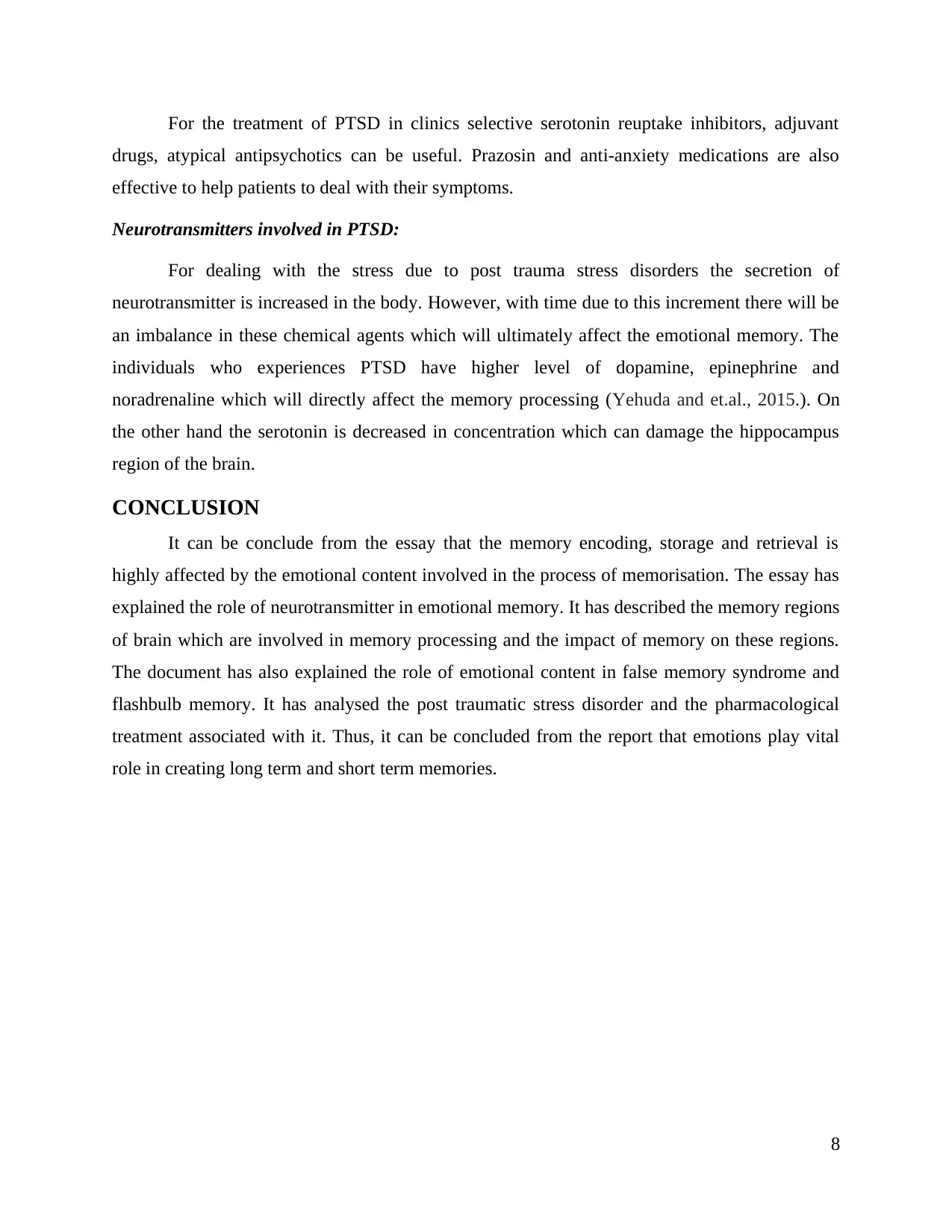
For the treatment of PTSD in clinics selective serotonin reuptake inhibitors, adjuvant
drugs, atypical antipsychotics can be useful. Prazosin and anti-anxiety medications are also
effective to help patients to deal with their symptoms.
Neurotransmitters involved in PTSD:
For dealing with the stress due to post trauma stress disorders the secretion of
neurotransmitter is increased in the body. However, with time due to this increment there will be
an imbalance in these chemical agents which will ultimately affect the emotional memory. The
individuals who experiences PTSD have higher level of dopamine, epinephrine and
noradrenaline which will directly affect the memory processing (Yehuda and et.al., 2015.). On
the other hand the serotonin is decreased in concentration which can damage the hippocampus
region of the brain.
CONCLUSION
It can be conclude from the essay that the memory encoding, storage and retrieval is
highly affected by the emotional content involved in the process of memorisation. The essay has
explained the role of neurotransmitter in emotional memory. It has described the memory regions
of brain which are involved in memory processing and the impact of memory on these regions.
The document has also explained the role of emotional content in false memory syndrome and
flashbulb memory. It has analysed the post traumatic stress disorder and the pharmacological
treatment associated with it. Thus, it can be concluded from the report that emotions play vital
role in creating long term and short term memories.
8
drugs, atypical antipsychotics can be useful. Prazosin and anti-anxiety medications are also
effective to help patients to deal with their symptoms.
Neurotransmitters involved in PTSD:
For dealing with the stress due to post trauma stress disorders the secretion of
neurotransmitter is increased in the body. However, with time due to this increment there will be
an imbalance in these chemical agents which will ultimately affect the emotional memory. The
individuals who experiences PTSD have higher level of dopamine, epinephrine and
noradrenaline which will directly affect the memory processing (Yehuda and et.al., 2015.). On
the other hand the serotonin is decreased in concentration which can damage the hippocampus
region of the brain.
CONCLUSION
It can be conclude from the essay that the memory encoding, storage and retrieval is
highly affected by the emotional content involved in the process of memorisation. The essay has
explained the role of neurotransmitter in emotional memory. It has described the memory regions
of brain which are involved in memory processing and the impact of memory on these regions.
The document has also explained the role of emotional content in false memory syndrome and
flashbulb memory. It has analysed the post traumatic stress disorder and the pharmacological
treatment associated with it. Thus, it can be concluded from the report that emotions play vital
role in creating long term and short term memories.
8
Paraphrase This Document
Need a fresh take? Get an instant paraphrase of this document with our AI Paraphraser
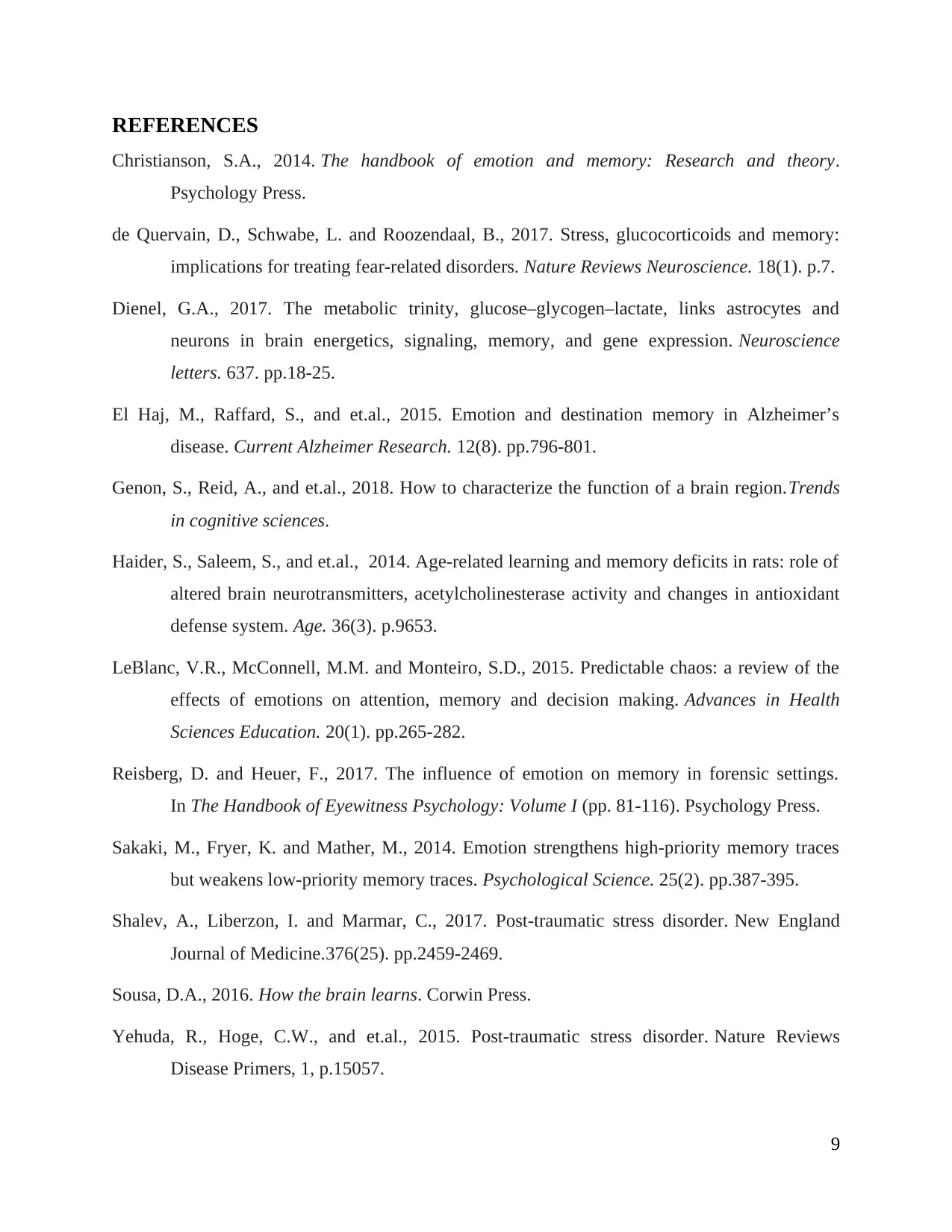
REFERENCES
Christianson, S.A., 2014. The handbook of emotion and memory: Research and theory.
Psychology Press.
de Quervain, D., Schwabe, L. and Roozendaal, B., 2017. Stress, glucocorticoids and memory:
implications for treating fear-related disorders. Nature Reviews Neuroscience. 18(1). p.7.
Dienel, G.A., 2017. The metabolic trinity, glucose–glycogen–lactate, links astrocytes and
neurons in brain energetics, signaling, memory, and gene expression. Neuroscience
letters. 637. pp.18-25.
El Haj, M., Raffard, S., and et.al., 2015. Emotion and destination memory in Alzheimer’s
disease. Current Alzheimer Research. 12(8). pp.796-801.
Genon, S., Reid, A., and et.al., 2018. How to characterize the function of a brain region.Trends
in cognitive sciences.
Haider, S., Saleem, S., and et.al., 2014. Age-related learning and memory deficits in rats: role of
altered brain neurotransmitters, acetylcholinesterase activity and changes in antioxidant
defense system. Age. 36(3). p.9653.
LeBlanc, V.R., McConnell, M.M. and Monteiro, S.D., 2015. Predictable chaos: a review of the
effects of emotions on attention, memory and decision making. Advances in Health
Sciences Education. 20(1). pp.265-282.
Reisberg, D. and Heuer, F., 2017. The influence of emotion on memory in forensic settings.
In The Handbook of Eyewitness Psychology: Volume I (pp. 81-116). Psychology Press.
Sakaki, M., Fryer, K. and Mather, M., 2014. Emotion strengthens high-priority memory traces
but weakens low-priority memory traces. Psychological Science. 25(2). pp.387-395.
Shalev, A., Liberzon, I. and Marmar, C., 2017. Post-traumatic stress disorder. New England
Journal of Medicine.376(25). pp.2459-2469.
Sousa, D.A., 2016. How the brain learns. Corwin Press.
Yehuda, R., Hoge, C.W., and et.al., 2015. Post-traumatic stress disorder. Nature Reviews
Disease Primers, 1, p.15057.
9
Christianson, S.A., 2014. The handbook of emotion and memory: Research and theory.
Psychology Press.
de Quervain, D., Schwabe, L. and Roozendaal, B., 2017. Stress, glucocorticoids and memory:
implications for treating fear-related disorders. Nature Reviews Neuroscience. 18(1). p.7.
Dienel, G.A., 2017. The metabolic trinity, glucose–glycogen–lactate, links astrocytes and
neurons in brain energetics, signaling, memory, and gene expression. Neuroscience
letters. 637. pp.18-25.
El Haj, M., Raffard, S., and et.al., 2015. Emotion and destination memory in Alzheimer’s
disease. Current Alzheimer Research. 12(8). pp.796-801.
Genon, S., Reid, A., and et.al., 2018. How to characterize the function of a brain region.Trends
in cognitive sciences.
Haider, S., Saleem, S., and et.al., 2014. Age-related learning and memory deficits in rats: role of
altered brain neurotransmitters, acetylcholinesterase activity and changes in antioxidant
defense system. Age. 36(3). p.9653.
LeBlanc, V.R., McConnell, M.M. and Monteiro, S.D., 2015. Predictable chaos: a review of the
effects of emotions on attention, memory and decision making. Advances in Health
Sciences Education. 20(1). pp.265-282.
Reisberg, D. and Heuer, F., 2017. The influence of emotion on memory in forensic settings.
In The Handbook of Eyewitness Psychology: Volume I (pp. 81-116). Psychology Press.
Sakaki, M., Fryer, K. and Mather, M., 2014. Emotion strengthens high-priority memory traces
but weakens low-priority memory traces. Psychological Science. 25(2). pp.387-395.
Shalev, A., Liberzon, I. and Marmar, C., 2017. Post-traumatic stress disorder. New England
Journal of Medicine.376(25). pp.2459-2469.
Sousa, D.A., 2016. How the brain learns. Corwin Press.
Yehuda, R., Hoge, C.W., and et.al., 2015. Post-traumatic stress disorder. Nature Reviews
Disease Primers, 1, p.15057.
9
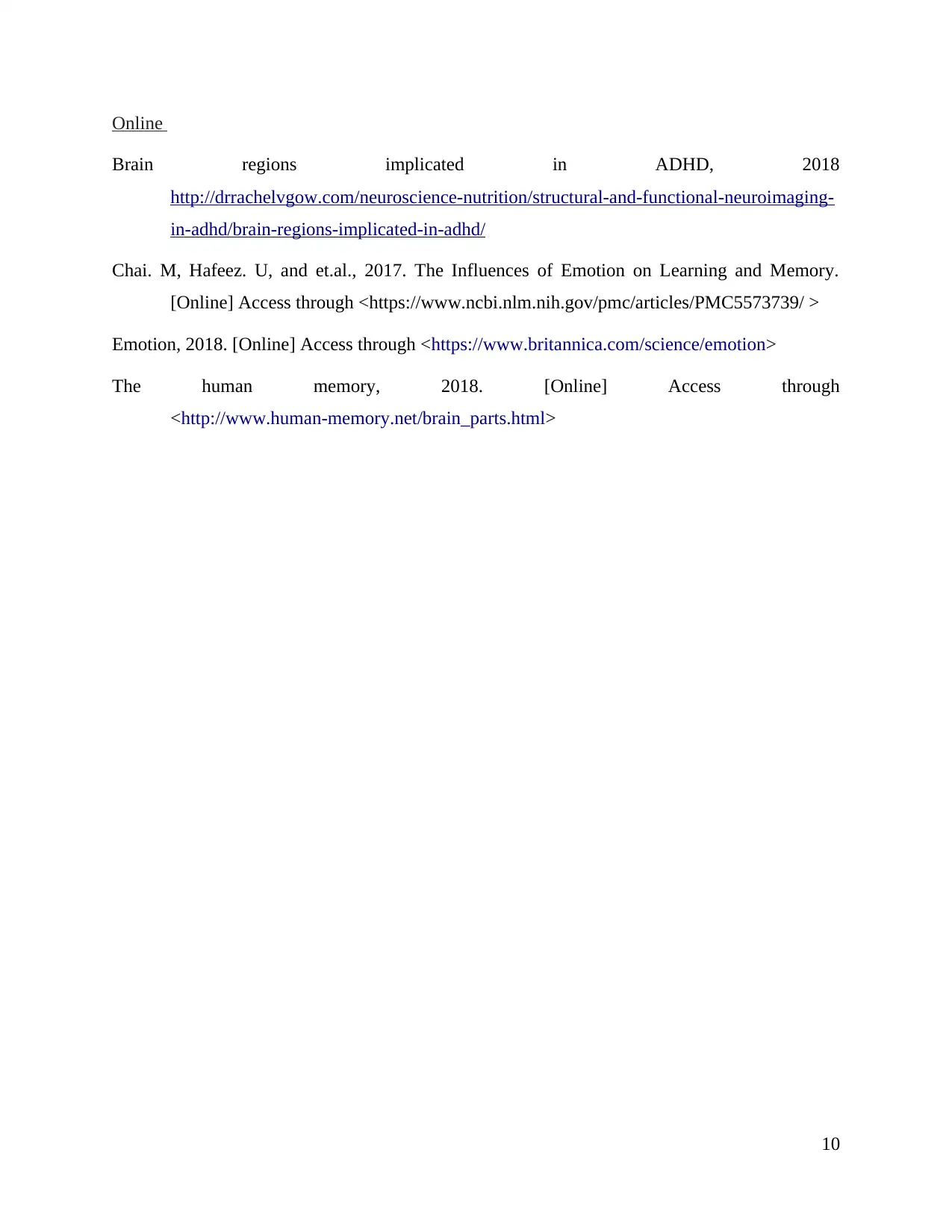
Online
Brain regions implicated in ADHD, 2018
http://drrachelvgow.com/neuroscience-nutrition/structural-and-functional-neuroimaging-
in-adhd/brain-regions-implicated-in-adhd/
Chai. M, Hafeez. U, and et.al., 2017. The Influences of Emotion on Learning and Memory.
[Online] Access through <https://www.ncbi.nlm.nih.gov/pmc/articles/PMC5573739/ >
Emotion, 2018. [Online] Access through <https://www.britannica.com/science/emotion>
The human memory, 2018. [Online] Access through
<http://www.human-memory.net/brain_parts.html>
10
Brain regions implicated in ADHD, 2018
http://drrachelvgow.com/neuroscience-nutrition/structural-and-functional-neuroimaging-
in-adhd/brain-regions-implicated-in-adhd/
Chai. M, Hafeez. U, and et.al., 2017. The Influences of Emotion on Learning and Memory.
[Online] Access through <https://www.ncbi.nlm.nih.gov/pmc/articles/PMC5573739/ >
Emotion, 2018. [Online] Access through <https://www.britannica.com/science/emotion>
The human memory, 2018. [Online] Access through
<http://www.human-memory.net/brain_parts.html>
10
⊘ This is a preview!⊘
Do you want full access?
Subscribe today to unlock all pages.

Trusted by 1+ million students worldwide
1 out of 12
Your All-in-One AI-Powered Toolkit for Academic Success.
+13062052269
info@desklib.com
Available 24*7 on WhatsApp / Email
![[object Object]](/_next/static/media/star-bottom.7253800d.svg)
Unlock your academic potential
Copyright © 2020–2025 A2Z Services. All Rights Reserved. Developed and managed by ZUCOL.